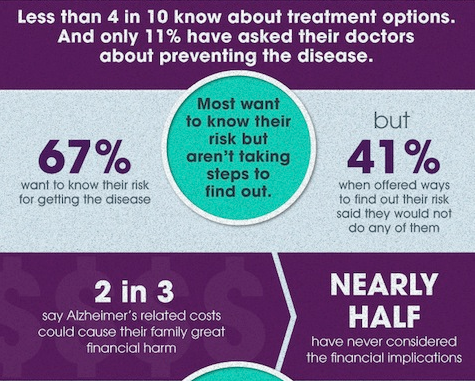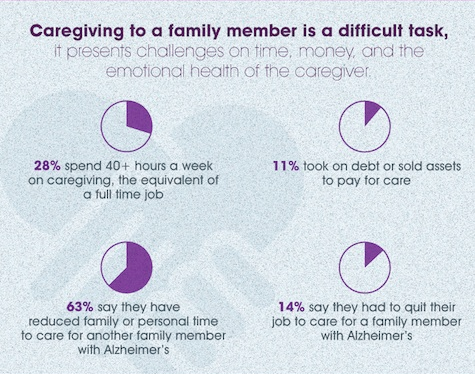Clients are very concerned about the financial ramifications of getting Alzheimer’s—they’re just not doing anything about it.
A recent survey performed by WebMD entitled “Insight Into Alzheimer’s Attitudes and Behaviors” polled 4,200 site users about their fears, beliefs and experiences with the disease. The results reveal that Alzheimer’s planning is a need that’s going unmet—and an opportunity for advisors to add value.

Currently, about 11 percent of those over 65 have Alzheimer’s, according to the Alzheimer’s Association, and that number is expected to triple by 2050 as baby boomers age. The estimated lifetime cost of care for someone with Alzheimer’s is $174,000. Many are completely unequipped to handle this additional expense.
Clients seem to recognize the very real financial threat that the disease represents. Of those polled in the WebMD study, 66 percent believe that Alzheimer’s could harm their family financially. However, this awareness hasn’t correlated into action, as 71 percent of respondents admit that their family is not financially equipped to handle the disease.
There are many ways to tackle this problem. Helping clients secure long-term care insurance is one possibility, albeit remote for many. Correctly managing Medicare decisions can also make a huge difference. Is standard Medicare the right choice for a client, or are they better off with Medicare Advantage? What if they need to switch? Should they add a supplemental Medigap plan (if they can)? What about prescription drug coverage? All of these are questions that a savvy advisor should be ready and able to answer (or bring up in the first place).
The financial danger threatens more than just the afflicted, however. Caregivers pay a heavy toll as well. According to the survey, 22 percent of respondents who know someone with Alzheimer’s have taken on some care responsibilities. Additionally, 22 percent of those who aren’t currently caregivers expect they would be the person responsible for the majority of caregiving if their parent or grandparent were diagnosed with Alzheimer’s.

Breaking these numbers down further, the survey notes that of those who have provided care, 28 percent say they’ve spent more than 40 hours a week on caregiving duties and 21 percent have worked fewer hours at a job because of caregiving. So, for many, caring for someone with Alzheimer’s not only interferes with their current job, but is, effectively, a second full-time job for which they receive no compensation. Fourteen percent of respondents actually had to quit their jobs to become full-time caregivers. And, that’s without even tackling the psychological and emotional burdens they bear.
Advisors must take seriously this potential to become a caregiver at any time—and the financial and mental stresses that accompany such responsibility—when dealing with any clients with aging parents. Whether it’s ensuring that funds are available to bring in outside caregivers to help relieve some of the burden, or ensuring that the client is budgeted to handle the potential reduction in income that could come from working less or even losing a job while acting as a caregiver, proper planning is paramount.

